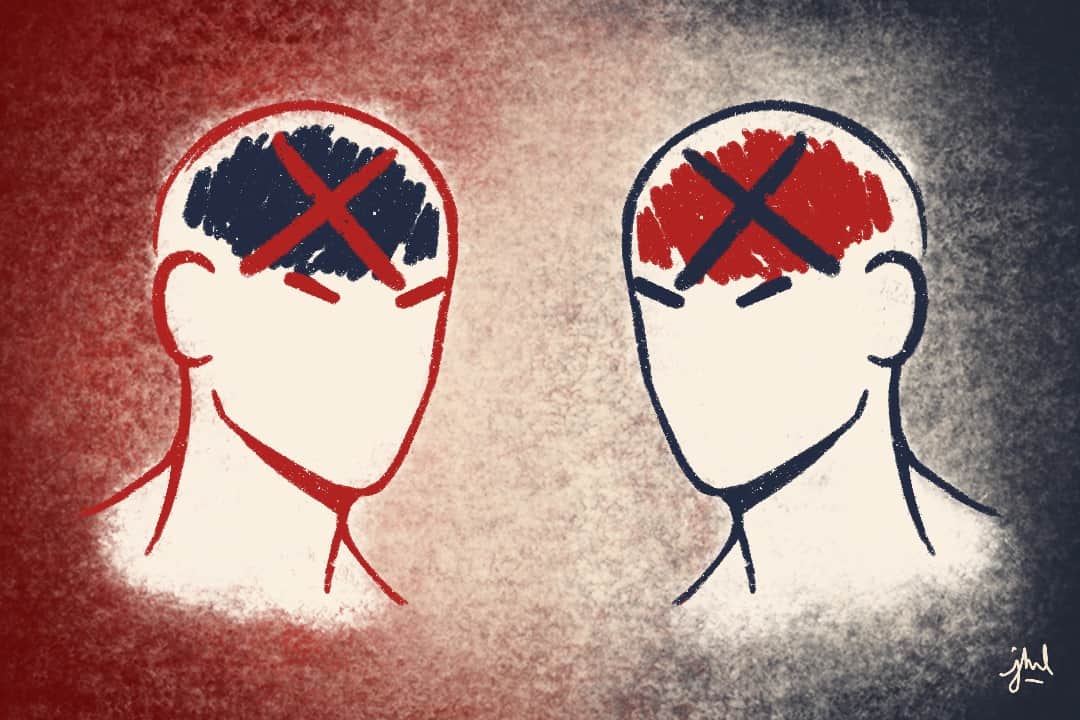Content warning: This article contains descriptions of violence and death.
An ideology is commonly defined as a set of beliefs and ideas that people and countries base their actions on. However, even a concept as simple as an ideology can be harmful. When political administrations promote ideologies that contradict all factual evidence, that can be lethal, especially when those manufactured ideologies are used to justify war.
In the case of the war between Russia and Ukraine, ideologies manufactured by Vladimir Putin, the Russian president, associate Ukraine’s independence with neo-Nazi activity, which the Russian administration is using to justify its invasion of Ukraine and the crimes it commits against the Ukrainian people.
However, on a smaller scale, blind adherence to an ideology can also cause disruptive discourse within a country. In Canada, large parts of the country were split ideologically when members of the Freedom Convoy insisted on defending anti-vaccine ideologies that were not founded on science, allowing no room for disagreement. In firm belief of their ideology, they marched across the country and disrupted the lives of many Canadians.
In both of these cases we can see what happens when people blindly follow manufactured ideologies and the dangers that can come with it.
False ideologies and the Russia-Ukraine war
On September 28, The New York Times released a month-long investigation into the Ukrainian government’s interception of the recordings of more than 4,000 phone calls from Russian soldiers in Bucha. Reporters at The New York Times translated the soldiers’ conversations in the calls made to their families back home, in which they divulged the atrocities committed during Russia’s attempt to annex Kyiv in March.
These atrocities fully contradict Vladimir Putin’s public statement back in April that referred to the documents regarding the Russian attacks as “provocation and fake.” As the attack progressed, the soldiers started describing the death of fellow soldiers within their troops, as well as body parts of civilians scattered across the ground. One soldier even confessed to executing three innocent men passing by their storehouse, and another referred to their orders as being akin to: “Kill any civilian that walks by and drag them into the forest.”
By the end of the report, a soldier is recorded saying, “Mom, we haven’t seen a single fascist here… This war is based on a false pretense. No one needed it. We got here and people were living normal lives… We all think the same thing: This war wasn’t needed.”
The elaborate details that the soldiers provided paint a picture of Russia’s atrocities in the war in Ukraine, revealing the harrowing reality of war ideology. Putin’s declaration that the two countries are “a single whole” and that Ukraine is “indulging neo-Nazis” served as the foundation for his ideology and reasoning for starting the Russia-Ukraine war.
Putin’s actions demonstrate how an ideology can manufacture an alienized enemy that must be defeated, which can then be used to justify the atrocities the soldiers described in Ukraine.
The way I see it, the history between Ukraine and Russia is an intricately extensive one, and the logic applied to interpret this war is unique in comparison to other global conflicts. Nevertheless, this war demonstrates the dangers of blind allegiance to a manufactured ideology.
Ideologies and the Freedom Convoy
Although incomparable to the clash of ideologies that resulted in the Russia-Ukraine war, the Freedom Convoy protests demonstrate the clash of ideologies amongst Canadians.
Earlier this year, hundreds of trucks parked across downtown Ottawa were adorned with the Canadian flag and signs demanding that the mask mandate be removed and that vaccinations not be mandatory. These protestors disrupted the lives of residents, businesses, and US-Canada border traffic. The protests even led Prime Minister Justin Trudeau to enforce the use of the historic Emergencies Act.
Despite the significant number of Freedom Convoy protestors that gathered in downtown Toronto, I recall how my friends and I dismissed that these protestors could represent the beliefs of most Canadians. Memes mocking the convoy were spreading so rapidly that they dissipated my concern of the intensity of the protests.
However, when walking past a protester who vigorously waved the Canadian flag while directly staring into my eyes at the intersection of Bloor Street West and Queens Park, a realization struck me. According to polling research firm Ekos Research Associates, approximately 30 per cent of Canadians were amongst the thousands of protestors convening across the country with such forceful willpower under an ideology that promoted an anonymous enemy and disregarded rational and science-based logic.
I was unwillingly taking part in the role of the antagonist in the ideological play written by the Freedom Convoy. This was especially dangerous considering that the support for their ideology and movement far overpowered any beliefs I had as an individual.
Ultimately, both the ideology that led to the Russia-Ukraine war and the ideology that led to the Freedom Convoy teach us a lesson that cannot be ignored. As young people of this generation, it is our duty to be equipped with our own independent lenses and to perceive the world while remaining unswayed by baseless ideological facades. While this is easier said than done, I believe in our generation’s pursuit of it.
Eleanor Park is a second-year student at Trinity College studying English and religion. She is an associate comment editor at The Varsity.


